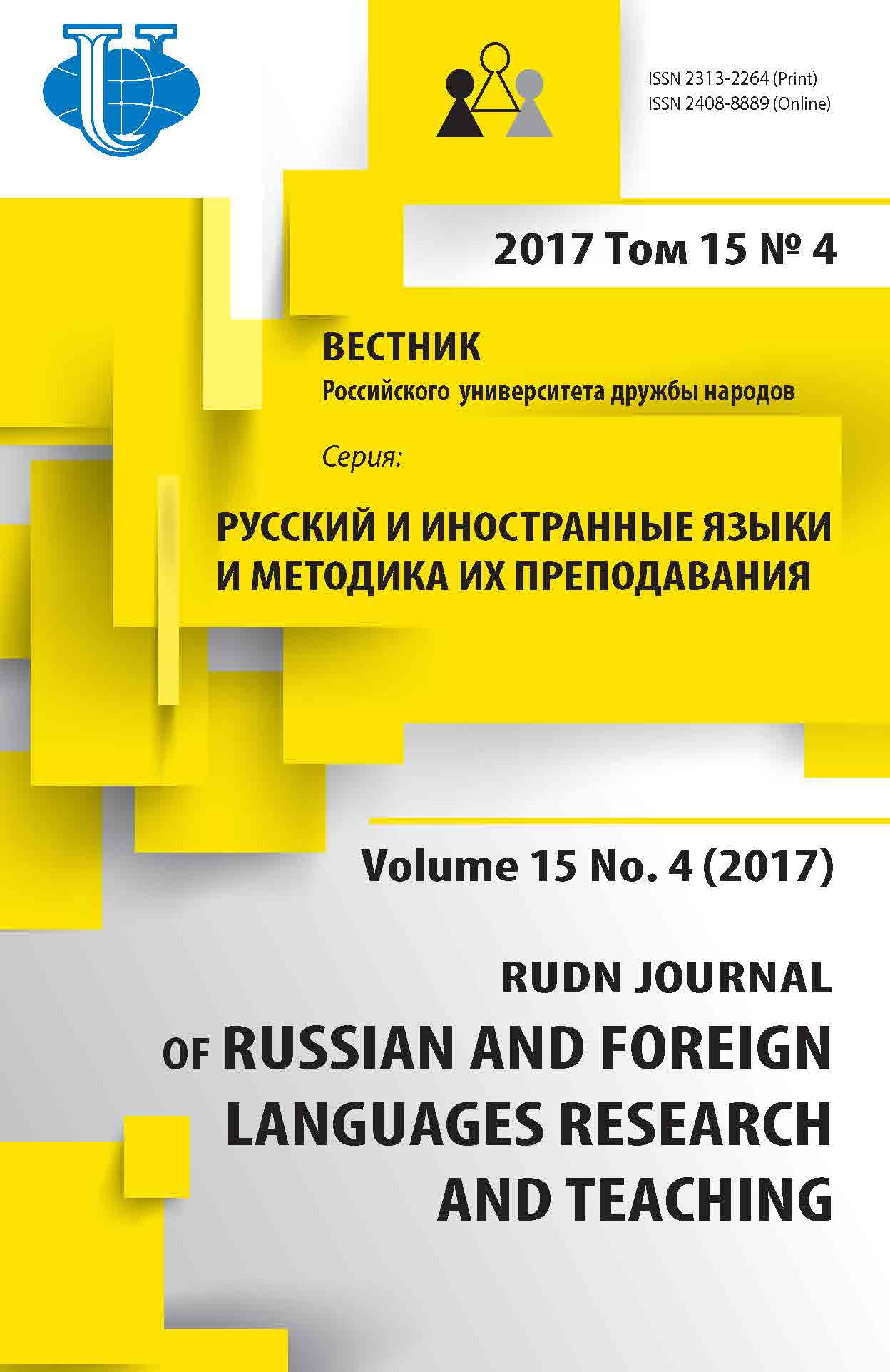GRAPHIC-SYMBOLIC SPACE OF LITERATURE TEXT IN THE SYSTEM OF TRAINING RUSSIAN LANGUAGE OF FOREIGNERS
- Authors: Petrova SM1
-
Affiliations:
- Federal State Autonomous Educational Institution of Higher Education “M.K. Ammosov North-Eastern Federal University”
- Issue: Vol 15, No 4 (2017)
- Pages: 414-426
- Section: Articles
- URL: https://journals.rudn.ru/russian-language-studies/article/view/17446
- DOI: https://doi.org/10.22363/2313-2264-2017-15-4-414-426
- ID: 17446
Cite item
Full Text
Abstract
The relevance of the article is determined by the insufficient knowledge of the problem, connected with the use of graphic-symbolic analysis of a literature text in the system of teaching Russian of foreigners. The purpose of the article is to determine the linguistic and cultural potential of the semiotic approach to the teaching of the Russian language of foreigners using literature text. As the educational material is the author’s method of graphic-symbolic analysis of the literature text, which is based on the use of the main provisions of semiotics, mnemonics, ergonomics, and the introduction of a new concept of “symbolic words” in the system of vocabulary and graphic symbols based on the poem by N.V. Gogol’s “Mertvie dushi” The teaching of the Russian language of foreigners on the basis of a literature text will enable them to better understand the history, philosophy of the studied language, Russian culture and literature, and contribute to its more effective assimilation. Author’s method of teaching Russian to foreigners is designed to determine the effectiveness of its use in the educational process at different stages of teaching Russian oа foreigners.
Keywords
About the authors
S M Petrova
Federal State Autonomous Educational Institution of Higher Education “M.K. Ammosov North-Eastern Federal University”
Author for correspondence.
Email: metlit@mail.ru
Petrova Svetlana Maximovna, Doctor of pedagogical sciences, full professor. Head of the Department of Russian as a Foreign Language Federal State Autonomous Educational Institution of Higher Education “M.K. Ammosov North-Eastern Federal University” Faculty of Philology. The author of over 200 scientific publications.
Kulakovsky str., 42, GUK, Yakutsk, Russia, 677000References
- Alefirenko, N.F. (2013). Lingvokulturologiya: tsennostno-smyslovoe prostranstvo yazyka [Cultural lingvistic: value-semantic space of language]. Moscow: Flinta; Science Publ. (In Russ).
- Balyhina, T.M., & Chzhao Yu. (2012). Ot metodiki k etnometodike [From methodology to ethnomethodics]. Moscow: RUDN Publ. (In Russ).
- Borbotko, V.G. (2011). Principy formirovaniya diskursa. Ot psiholingvistiki k lingvosinergetike [Principles of the formation of discourse. From psycholinguistics to linguosynergetic]. Moscow: Librokom Publ. (In Russ).
- Budanov, V.G. (2009). Metodologiya sinergetiki v postneklassicheskoy nauke i v obrazovanii [Methodology of synergetics in post-non-classical science and education]. Moscow: Librokom Publ. (In Russ).
- Vishnyakov, S.A. (2013). Russkiy yazyk kak inostrannyi [Russian as a Foreign Language]. Moscow: Flinta; Nauka Publ. (In Russ).
- Gogol, N.V. (1962). Mertvye dushi [Dead Souls]. Moscow: Prosveshhenie Publ. (In Russ).
- Guseva, I.S., & Rumjanceva, N.M. (2013). Intensivnyj kurs russkogo yazyka (RUDN) [Intensive Course of the Russian Language (PFUR)]. Moscow: Drofa Publ. (In Russ).
- Zinchenko, V.G., Zusman, V.G., & Kirnoze, Z.I. (2007). Mezhkulturnaya kommunikaciya. Ot sistemnogo podhoda k sinergeticheskoy paradigm [Intercultural communication. From the system approach to the synergetic paradigm]. Moscow: Flinta; Science Publ. (In Russ).
- Kim, I.N. (2015). Budushhee regionalnogo vuza v kontekste strategicheskogo razvitija otechestvennogo obrazovanija. Vysshee obrazovanie v Rossii [The Future of a Regional Higher Educational Institution in the Context of the Strategic Development of the Russian Education. Higher Education in Russia]. 1. (In Russ).
- Kornilov, O.A. (2011). Yazykovye kartiny mira kak proizvodnye nacionalnyh mentalitetov [Language pictures of the world as derivatives of national mentality]. Moscow: KDU Publ. (In Russ).
- Lotman, Yu.M. (2014). Vnutri myslyashhih mirov [Inside the thinking worlds]. Saint Petersburg: Azbuka, Azbuka-Attikus Publ. (In Russ).
- Lysakova, I.P. (2016). Metodika obucheniya russkomu yazyku kak inostrannomu [Methods of teaching Russian as a foreign language]. Moscow: Russian Language. Courses Publ. (In Russ).
- Malyshev, V. (2009). Prostranstvo mysli i istoki nacionalnogo haraktera [The space of thought and the origins of the national character]. Saint Petersburg: Aleteiya. (In Russ).
- Mechkovskaja, N.B. (2004). Semiotika: Jazyk. Priroda. Kultura [Semiotics: The Language. Nature. Culture]. Moscow: Akademiya Publ. (In Russ).
- Moskalchuk, G.G. (2010). Struktura teksta kak sinergeticheskiy process [Text structure as a synergetic process]. Moscow: Editorial URSS Publ. (In Russ).
- Piotrovskij, R.G. (1995). Teoreticheskie i prikladnye problemyy yazyikoznaniya na rubezhe XX v. [Theoretical and applied problems of linguistics at the turn of the twentieth century]. Proceedings of International Conference. 2. Moscow: Philology Publ. (In Russ).
- Plotnikov, B.A. (1992). Semiotika teksta. Paragrafemika [Semiotics of the text. Paragraphemika]. Minsk: Vyshyeyshaya shkola Publ. (In Russ).
- Pochepcov, G.G. (2002). Semiotika [Semiotics]. Moscow: Refl. buk: Vakler Publ. (In Russ).
- Stepanov, Yu.S. (2010). V trehmernom prostranstve yazyka. Semioticheskie problemy lingvistiki, filosofii, iskusstva [In the three-dimensional space of language. Semiotic problems of linguistics, philosophy, art]. Moscow: Science Publ. (In Russ).
- Strelchuk, E.N. (2011). Russkiy yazyk i kultura rechi v inostrannoy auditorii. Teoriya i praktik [Russian language and culture of speech in a foreign audience]. Moscow: Flinta Publ. (In Russ).
- Frumkina, R.M. (2013). Psiholingvistika [Psycholinguistics]. Moscow: Akademiya Publ. (In Russ).
- Havronina, S.A., & Shirochenskaya, A.I. (2013). Russkyi yazyk v uprazhneniyah [Russian language in exercises]. Moscow: Russian Language. Course Publ. (In Russ).
- Chertov, L.F. (2014). Znakovaya prizma: statji po obshhey i prostranstvennoy semiotike [Signed prism: articles on general and spatial semiotics]. Moscow: Yazyki slavyanskoy kultury Publ. (In Russ).
- Shaklein, V.M., & Mikova, S.S. (2015). Lingvokulturnoe soderzhanie yazyka [Linguistic and cultural content of the language]. Moscow: PFUR Publ. (In Russ).
- Shchukin, A.N. (2010). Sovremennye intensivnye metody i tehnologii obucheniya inostrannym yazykam [Modern intensive methods and technologies of teaching foreign languages]. Moscow: Filomatis Publ. (In Russ).
- Egorova, A.I. (Ed.). (2003). Etnicheskaya psihologiya. Hrestomatiya [Ethnic psychology. Reader]. Saint Petersburg: Speech Publ. (In Russ).
Supplementary files














